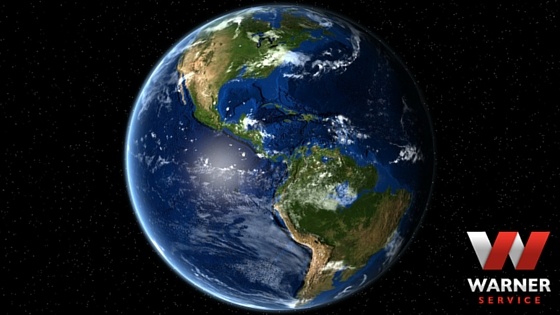
Scientists have spent years studying climate change, and many believe that the world is getting hotter and the air has more greenhouse gas than ever. In short, a majority of scientists feel evidence strongly suggests that global warming is real. While there is certainly a healthy debate on the existence and current impact of global warming, there should be no debate about the need to protect our planet and its finite resources.
Now, like most, it's hard to quantify the impact a warmer planet could have on our daily lives. Regardless of your stand on global warming, it's worth taking a look at what impacts it could have on your home should the scientific prognasticators be spot on with their assessment. Here’s Warner Service’s guide to how global warming could affect your home in the future, and why you remain actively engaged in understanding its potential impact:
- Your home might not have access to fresh water. Global warming could cause severe draughts, increased evaporation and changes in precipitation patterns. All of this impacts the fresh water levels in lakes and rivers, which are the source of drinking and bathing water for many homes. Scientists expect these lake levels to continue dropping as the global temperature rises. For example, the water levels in the Great Lakes, which supply nearly 18 percent of the world’s fresh water, have declined since 1986. If the temperature continues to rise, fresh water could soon be a thing of the past.
- Your coastal home could end up underwater. Global warming could also cause sea ice to melt at an alarming rate. (In fact, 30 percent of sea ice has melted since 1979.) If the sea ice continues to melt at this rate, around 56 million people will be displaced around the world because coastal homes in areas like New York City, London, Sydney and Rio de Janeiro will look like this.
- Your home will be more likely to be subjected to wildfires. Wildfires are uncontrollable fires in an area of combustible, dry vegetation. Most people hear of the massive wildfires in California; however, as global warming continues to cause severe draughts, wildfires will become more common in other states like New Jersey, Maryland and Pennsylvania. They’ll also spread quicker and burn longer, harming nearby homes, parks and forests. To learn more about wildfires and how to prepare your home, visit Ready.gov.
- Your home could get hotter. Because global warming could cause steadily rising temperatures, homes that experience warm climates won’t be able to beat the heat with a little air conditioning in a few years. Even if air conditioning could do the trick...
- Your energy bill could significantly rise. Higher temperatures over the next decade means an increased need for air conditioning, but the bad news is there will be less water due to severe droughts, which means less power production. This combination doesn't work with your energy bill, no matter how many eco-friendly practices you adopt.
- Your home’s air quality could decline. We do our best to get rid of pathogens in our home, but as factories and industry continue to emit greenhouse gases into the air, people around the world will be breathing in impure air. In fact, the United States is already looking at spending $60 billion to combat respiratory diseases and symptoms.
- You’ll could spend more money repairing your home, regardless of its location. The significant weather changes will cause homeowners around the world to adjust their home accordingly. Most homeowners will have to adapt to the stark changes between severe summers and harsh winters, and the total bill could get lengthy quick.
Though global warming can affect your home in the future, it doesn’t have to. To learn how you can cut down on carbon emissions and fight global warming, visit the Natural Resources Defense Council.
To schedule an appointment with Warner Service, click here.


